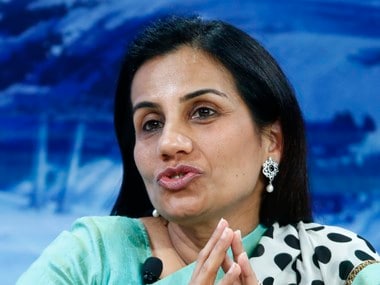Fitch ratings has issued a warning to ICICI Bank, saying its reluctance to welcome an independent probe of the ongoing Videocon loan controversy has ‘created doubts over the strength of its corporate governance practices.’ This is the first time that a large global institution has issued a formal comment on the matter. It tells us a lot about the mess ICICI Bank has created for itself by not acting transparently on the issue from the very beginning and not welcoming an independent probe, beyond fiercely defending its chief executive officer, who is facing charges of nepotism. This fuels suspicion that ICICI Bank indeed has information to hide with respect to the said loan deal and the Kochhars’ involvement. Fitch, in a note on Monday, said: “The allegation relates to a USD500 million loan to (the) Videocon Group, whose controlling shareholder co-founded a separate company with the spouse of ICICI’s CEO. A significant portion of the loan has since become non-performing. ICICI’s board has denied any wrongdoing, highlighting that the loan was underwritten in accordance with the bank’s credit standards and was extended as part of a consortium involving over 20 banks. The bank has stressed that it has not given any credit to the borrower group outside of the consortium. Nevertheless, the presence of the bank’s CEO on this credit committee - and the bank’s reluctance to support an independent probe - have, in our opinion, created doubts over the strength of its corporate governance practices". Following this statement, the rating agency makes three key observations/statements: [caption id=“attachment_4425675” align=“alignleft” width=“380”]  Chanda Kochhar, Managing Director and Chief Executive Officer of ICICI Bank. Reuters[/caption] Firstly, corporate governance at private banks are generally stronger than state-owned banks owing to better structure but this assumption could come under question if the investigations expose misconduct at ICICI, Second, the investigation could also undermine investor confidence in the bank, with potential implications for funding costs and liquidity in an extreme scenario, Third, Fitch would take appropriate rating action if risks to the bank’s reputation and financial profile were to rise considerably. These observations/warnings put the case in clear perspective. The question here is about the greater principles of corporate governance standards and of the conduct of the management and board of India’s second largest private bank, and not necessarily about the financial loss ICICI Bank may incur from the Videocon non-performing asset (NPA). As Fitch has noted, even if ICICI were to write-off its entire exposure to the Videocon loan, it wouldn’t matter much to the bank’s balance sheet given its strong capital levels (core capitalisation was 14.2 percent in December 2017, among the highest in the sector). It is highly surprising as to why a bank of the stature of ICICI is still not welcoming an independent probe into the matter even if, let’s say, it believes that there is no wrongdoing on the CEO’s part in the Videocon loan deal. The bank has shown a high degree of defiance and has resorted to technicalities to insulate itself from allegations pertaining to nepotism. For instance, in the context of allegations with respect to Avista Advisory group, ICICI Bank said the Companies Act excludes one’s brother-in-law from the definition of a ‘relative’. But, in the interest of high corporate governance standards, shouldn’t the managing director tread with caution and make proper disclosures about a family member’s involvement in a business decision? Also, the argument that CEO Kochhar wasn’t aware about her husband’s business relations with Dhoot is hard to believe for any observer. There are several missing links in the bank’s narrative regarding the Videocon loan. To begin with, the loan transaction with Videocon was a straight transaction. Some 12 companies of the Videocon group were arranged as co-obligors to the loan, which means that in the eventuality of a default, these companies will repay debt or surrender their assets to service the debt. Why, in the first place, did Videocon bring in companies such as Evan Fraser, registered as a realty and trading business, to play the role of a guarantor in the Videocon loan? Secondly, one of the companies that are part of the obligators to Videocon—Evan Fraser—was much smaller in size with a turnover of just about Rs 75 crore, according to RoC documents. When creating a charge against this company for Rs 650 crore, didn’t the bank take into account the size of the firm and its repayment capacity? It should have, for the Videocon loan turned NPA (non-performing asset) later. More important, the ICICI Bank loan to Videocon was classified as an NPA in late 2017. Did the bank approach the 12 co-obligor firms listed by the Videocon group for recovery? After all, these 12 companies were presented as co-obligors for this very purpose. These are questions that need answers as this writer pointed out in an earlier column . ICICI Bank, undoubtedly, is one of the banking entities that played an important role in shaping the Indian private banking industry. It is one of the few Indian banks that can compete in the global banking landscape with its size and presence in critical markets. Its CEO Chanda Kochhar is a highly regarded banker globally. There is also a possibility that all the charges against Kochhar with respect to the Videocon loan are unfounded. However, the bank has to act in a transparent manner to come out of this mess. By refusing to welcome an independent probe, the bank is attracting attention that questions its reputation, evident from the way global agencies have begun taking note of things.
It’s highly surprising as to why a bank, of the stature of ICICI, is still not welcoming an independent probe into the Videocon loan controversy.
Advertisement
End of Article


)

)
)
)
)
)
)
)
)



